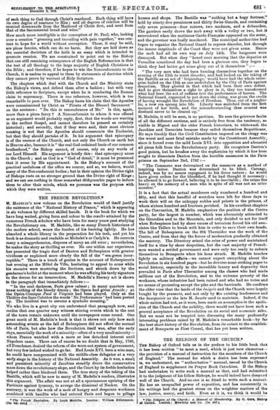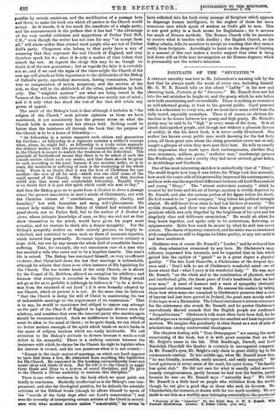THE RELIGION OF THE CHURCH.*
Tn Bishop of Oxford tolls us in the preface to his little book that it has been written " to meet a need, which is just now clamorous— the provision of a manual of instruction for the members of the Church of England." The manual for which a desire has been expressed is, we understand, an " authoritative " manual, issued by the Church of England to supplement its Prayer Book Catechism. If the Bishop had undertaken to write such a manual as that, and had submitted it to the judgment of his fellow-Bishops, ho would indeed have deserved well of the Church. And no one is so fitted to write such a manual. He has an unequalled power of exposition, and has consistently in his writings laid the greatest stress on the weightier matters of the law, justice, mercy, and faith. Even as it is, we think it would be • The Religion of the Clare Is: a Manual of Iffemberebir. By 0. ON% Bishop of Oxford. London: itowbray and Co. [is. =t.1
possible by certain omissions, and the modification of a passage here and there, to make his book one which all parties in the Church would accept. As it stands, it is too much the manifesto of a single party, and the announcement in the preface that it has had " the advantage of the very careful criticisms and suggestions of Father Paul Bull, C.R.," even though the writer has not seen his way " to accept them all," will alarm rather than attract most people who are not of Father Bull's party. Clergymen who belong to that party have a way of assuming that they represent the real Church of England, and may therefore speak for it ; since it is only a matter of time before they absorb the rest. As regards the clergy this may be so, though wo doubt it of the new generation ; but as regards the laity it is certainly not so ; and if we read the signs of the times aright the Church of the new age will attach as little importance to the shibboleths of the Bishop of Oxford's party, apostolical succession, fasting communion, invoca- tion or comprecation of saints, purgatory, and the unction of the sick, as they will to the shibboleth of the other, justification by faith only. The " weightier matters " are what are being tested in the furnace of the trenches, while the other things are merely out of mind ; and it is only what has stood the teat of fire that will retain any power of appeal. The merit of the Bishop's book is that although it includes in "the religion of the Church " such private opinions as those we have mentioned, it yet consistently lays the greater stress on what the Church holds in common and has always held. Nothing could be better than the insistence all through the book that the purpose of the Church is to be a home of fellowship :-
" As fellowship in a nation supports each citizen and guarantees his freedom ; as fellowship in a regiment sustains a soldier's courage when, alone, ho might fail ; as fellowship in a trade union supports the solitary worker with the protection of comradeship—so fellowship in the Church is meant to sustain the weakness of the individual. The principle of brotherhood means that there is to be asked of each the utmost service which each can render, and that there should be given to each according to his need, because if one member suffer, or is in want, the weakness or suffering of each is the weakening of the whole body. There is no doubt that it was the love of Christians for one another—the care of all for each—which was one chief cause of the rapid spread of the Church. Men were drawn out of that loveless world into that warm and comfortable fellowship. Equally there is no doubt that it is just this spirit which could win men to-day."
And then the Bishop goes on to quote from A Student in Arms a passage about the present association in men's minds of Christianity, not with the Christian virtues of " unselfishness, generosity, charity, and humility," but with formalism and smug self-righteousness. We cannot help wishing that the Bishop of Oxford had submitted his proof-sheets, not to Father Bull, but to the author of A Student in Arms, whose intimate knowledge of men, as they are and not as they show themselves to the priest, would have given his pages more actuality, and we venture to think also a deeper sympathy. For the Bishop's; sympathy strikes us, while entirely genuine, as largely in- tellectual, and restricted to cases, such as those of economic injustice, which interest him personally. Economic injustice covers certainly a large field, but not by any means the whole field of remediable human suffering. Take, for example, the not uncommon ease of a man who has married a wife who turns out to be a hopeless lunatic. The man's life is ruined. The Bishop has convinced himself, on very insufficient evidence, that Christ laid down the law that marriage is indissoluble, although he admits that there is no other instance of His legislating for the Church. The too tender heart of the early Church, as is shown by the Gospel of St. Matthew, allowed an exception for adultery; and because that exception is recorded in the Canon the Bishop would not go so far as to prohibit it (although ho believes it " to be a declen- sion from the standard of our Lord ") if it were formally adopted by our Church, which at present it is not. At the same time he believes " that the Church is doing the will of Christ in maintaining the law of indissoluble marriage as the requirement of its communion." That is to say, he would in conscience feel obliged to oppose any attempt on the part of the Church of England to legitimize divorce even for adultery, and considers that even the innocent party who marries again should be excommunicated. Such an indifference to human suffering must be alien to the mind of Christ ; to be quite frank, we can think of no better modern example of the spirit which binds on nien's,backs in the name of religion burdens which are really intolerable. We call attention to the Bishop's attitude to divorce because it marks a real defect in his sympathy. There is a striking contrast between the insistence with which he claims for the Church the right to legislate when his interest is roused, and his non possainua when it is not roused :-
"Except in the single matter of marriage, on which our Lord appears to have laid down a law, He abstained from anything like legislation for His Church. He expressed in His teaching extraordinarily luminous moral ideas and ideals of duty. But He left it to the Church to apply these ideals and ideas to a system of moral discipline, and He gave to the Church a Divine authority to exercise this discipline."
There is one other weakness in the book which we must point out briefly in conclusion. Markedly intellectual as is the Bishop's own tem- perament, and also his theological position, for he defends the scientific criticism of the Biblical books (though he allows himself to speak of the "records of the forty days after our Lord's resurrection ") and sees the necessity of interpreting certain article, of the Creed in accord- ance with what modem science makes " coneeivable," 'he- seems to
have collected into his book every passage of Scripture which appears to disparage human intelligence, to the neglect of those far more numerous ones which speak of wisdom as God's gift to men. This is not good policy in a book meant for Englishmen ; for it savours too much of Roman methods. The Roman Church tells its members to receive what it teaches with docility ; the English Church, as the Bishop admits, tells its members to accept no teaching that they cannot verify from Scripture. Accordingly to insist on the dangers of learning in a manual of this sort makes a reader suspect that what is being laid down will as little bear investigation as the Roman dogmas; which is presumably not the writer's intention.













































 Previous page
Previous page